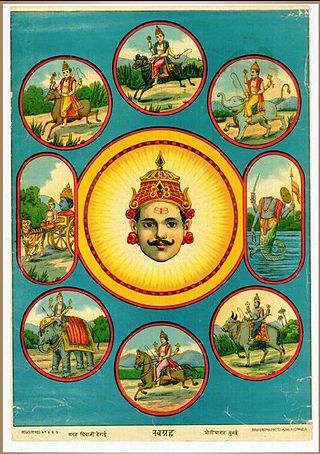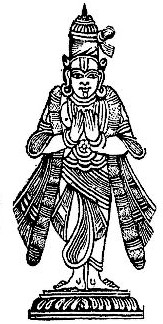Related Research Articles

Brihaspati, is a Hindu god. In the ancient Vedic scriptures of Hinduism, Brihaspati is a deity associated with fire, and the word also refers to a god who counsels the devas and devis. In some later texts, the word refers to the largest planet of the solar system, Jupiter, and the deity is associated with the planet as a Navagraha.

Chandra, also known as Soma, is the Hindu god of the Moon, and is associated with the night, plants and vegetation. He is one of the Navagraha and Dikpala.
Criticism of Hinduism has been applied to both historical and current aspects of Hinduism, notably Sati and the caste system.

The navagraha are nine heavenly bodies and deities that influence human life on Earth according to Hinduism and Hindu astrology. The term is derived from nava and graha. The nine parts of the navagraha are the Sun, Moon, planets Mercury, Venus, Mars, Jupiter, and Saturn, and the two nodes of the Moon.
In Hinduism, Rishabha is one of the twenty-four avatars of Vishnu in the Bhagavata Purana. Some scholars identify this avatar to be the same as the first tirthankara of Jainism, Rishabhanatha. Shaiva texts like the Linga Purana regard Rishabha to be among the 28 avatars of Shiva. Rishabha is also found in Vedic literature, where it means the "bull" and is an epithet for Rudra (Shiva).

Bhoothath Alvar is one of the twelve Alvar saints of South India, who were known for their affiliation to the Vaishnava tradition of Hinduism. The verses of Alvars are compiled as Nalayira Divya Prabandham and the 108 temples revered are classified as Divya Desams. Bhoothath is considered second in the list of the three principal Alvars, with the other two being Poigai Alvar and Pey Alvar, collectively called Mutalamalvargal who are known to be born out of divinity. Bhoothath composed hundred verses that are classified as Irantam Tiruvantati and his composition is set in the antati style in which the ending syllable is the starting one for the next verse.

Pey Alvar is one of the twelve Alvar saints of South India, who are known for their affiliation to Vaishnava tradition of Hinduism. The verses of Alvars are compiled as Nalayira Divya Prabandham and the 108 temples revered are classified as Divya Desams. Pey Alvar is considered third in the list of the three principal Alvars, with the other two being Poigai Alvar and Bhoothath Alvar, collectively called Mutalamalvargal who are known to be born out of divinity. Pey Alvar composed hundred verses that are classified as Munram Tiruvantati and his composition is set in the antati style in which the ending syllable is the starting one for the next verse.

Mangalasasanam refers to a Vaishnava concept in Hinduism, where a devotee offers their salutations and felicitations upon God due to a profound sense of concern for the latter, and also as an exercise of forgetting their sense of self.

Budha is the Sanskrit word for the planet Mercury. Budha is also a god of Planet Mercury.
Premanand Krushanram Bhatt (1636–1714), also known as Premanand, was a medieval Gujarati poet and Maanbhatt known for his Akhyana compositions.

Dharmaraja Ratha is a monument in the Pancha Rathas complex at Mahabalipuram, on the Coromandel Coast of the Bay of Bengal, in the Kancheepuram district of the state of Tamil Nadu, India. It is an example of monolith Indian rock-cut architecture. Dating from the late 7th century, it is attributed to the reign of King Mahendravarman I and his son Narasimhavarman I of the Pallava Kingdom. The entire complex is under the auspices of the Archaeological Survey of India (ASI). It is one of the Group of Monuments at Mahabalipuram that were designated as a UNESCO World Heritage Site since 1984.

Ananta, is a Sanskrit term, and primarily an epithet of Vishnu.
Praśastapāda was an ancient Indian philosopher. He wrote the Padārtha-dharma-saṅgraha and a commentary, titled Praśastapāda Bhāṣya, on the Vaisheshika Sutras of Kanada ; both texts are comprehensive books in physics. In these texts Prashastapada discusses the properties of motion. Ganganath Jha had translated Praśastapāda Bhāṣya which was published in 1916. Prashasta or Praśasta means praised or praiseworthy, lauded or laudable, commended or commendable or eulogized.

Isaignaniyar, also spelt as Isainaniyar, Isaignaniyaar, Isaignaniar and Isaijnaniyar and also known as Isai-jnani Ammaiyar, is the mother of Sundarar, one of the known Nayanar saints. She is regarded as a Nayanar saint, venerated in the Hindu sect of Shaivism, along with her husband Sadaiya Nayanar. She is counted as the last in the list of 63 Nayanars.

Sadaiya Nayanar or Sadaiyar is a 7th century Nayanar saint in the Hindu sect of Shaivism, venerated for being father of the prominent saint Sundarar rather than for individual merit. He and his wife Isaignaniyar are generally counted as sixty-second and sixty-third on the list of the sixty-three Nayanar saints. Sundarar is the only Nayanar with both parents venerated.
Tiru Nilakanta Yazhpanar was a Nayanar saint, venerated in the Hindu sect of Shaivism. He is generally counted as the sixty-first in the list of 63 Nayanars. While the first part of his name can be spelt as Tirunilakanta, Tirunilakantha, Tiru Neelakanta, Tiru Nilakanta, Nilakantan and Thiruneelakanda, Yazhpanar is spelt as variously as Yalppanar, Yalapannar, Yalpanar and Yazhpaanar. He is described as a companion of Sambandar, one of the most prominent Nayanars.
Tirunilakanta Nayanar, also known as Tirunilakanta, Nilakantan and Tirunilakantar (Thiruneelakandar) was a Nayanar saint, venerated in the Hindu sect of Shaivism. He is generally counted as the second in the list of 63 Nayanars.
Roshen Dalal is an Indian historian and writer of books for adults and children on the history of India and its religions. She has a PhD in Indian Ancient History. Roshen Dalal was born in Mussoorie and studied in various schools across the country. After a BA (Hons) in history from the University of Bombay, she completed an MA and PhD in Ancient Indian History from Jawaharlal Nehru University, New Delhi. She has taught at both school and university, and been involved in research in the fields of indian history, religion and philosophy, and education.She lives in Dehradun.
Shridhar Brahmanand Nazarekar, popularly known as Shridhar Swami Nazarekar or Shridhar Pandit, was a popular Marathi Akhyanaka (narrative) poet and philosopher who wrote several caritra granthas in the 17th and 18th centuries. Shridhara was a puranik, that is one who recite stories from Puranas. Later he began to compose works himself in a simple devotional style, and were not only extremely popular, but were revered and worshipped like sacred texts.
Madhva Vaishnavas or Sadh Vaishnavas or Madhvas are Hindu communities in India, who follow Sadh Vaishnavism and Dvaita philosophy propounded by Madhvacharya. They are found mostly in the Indian states of Karnataka, Maharashtra, Goa, Tamil Nadu, Kerala, Telangana and Andhra Pradesh.
References
- ↑ Dalal, Roshen (2010). Hinduism: An Alphabetical Guide By Roshen Dalal. ISBN 9780143414216.
- ↑ Dalal, Roshen (2010). Hinduism: An Alphabetical Guide By Roshen Dalal. ISBN 9780143414216.